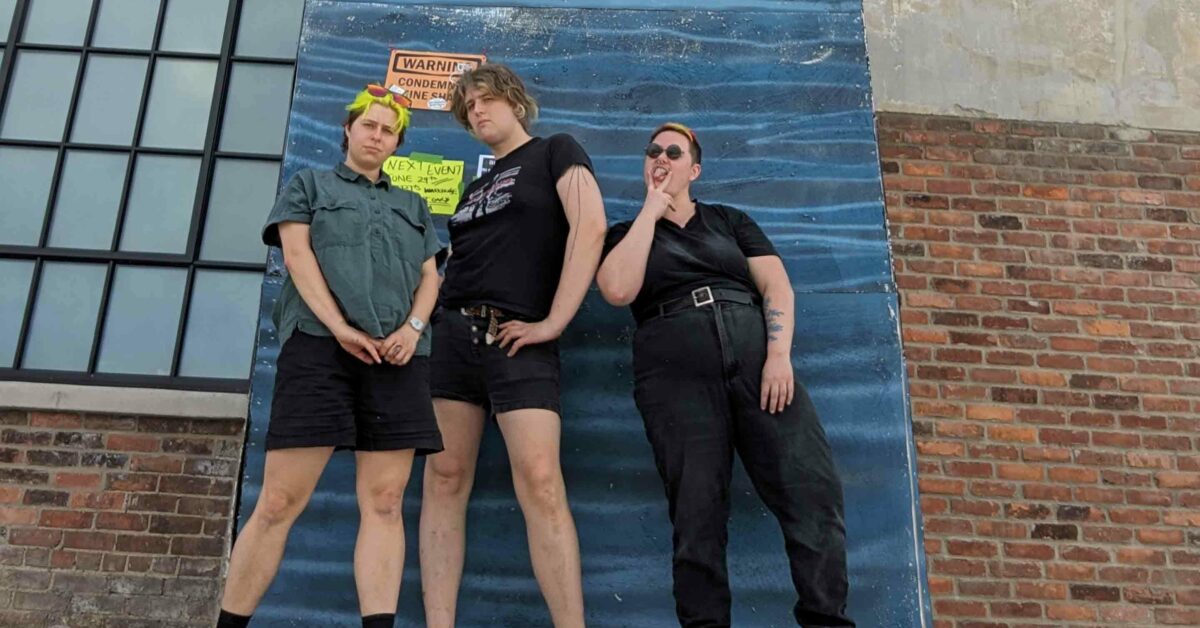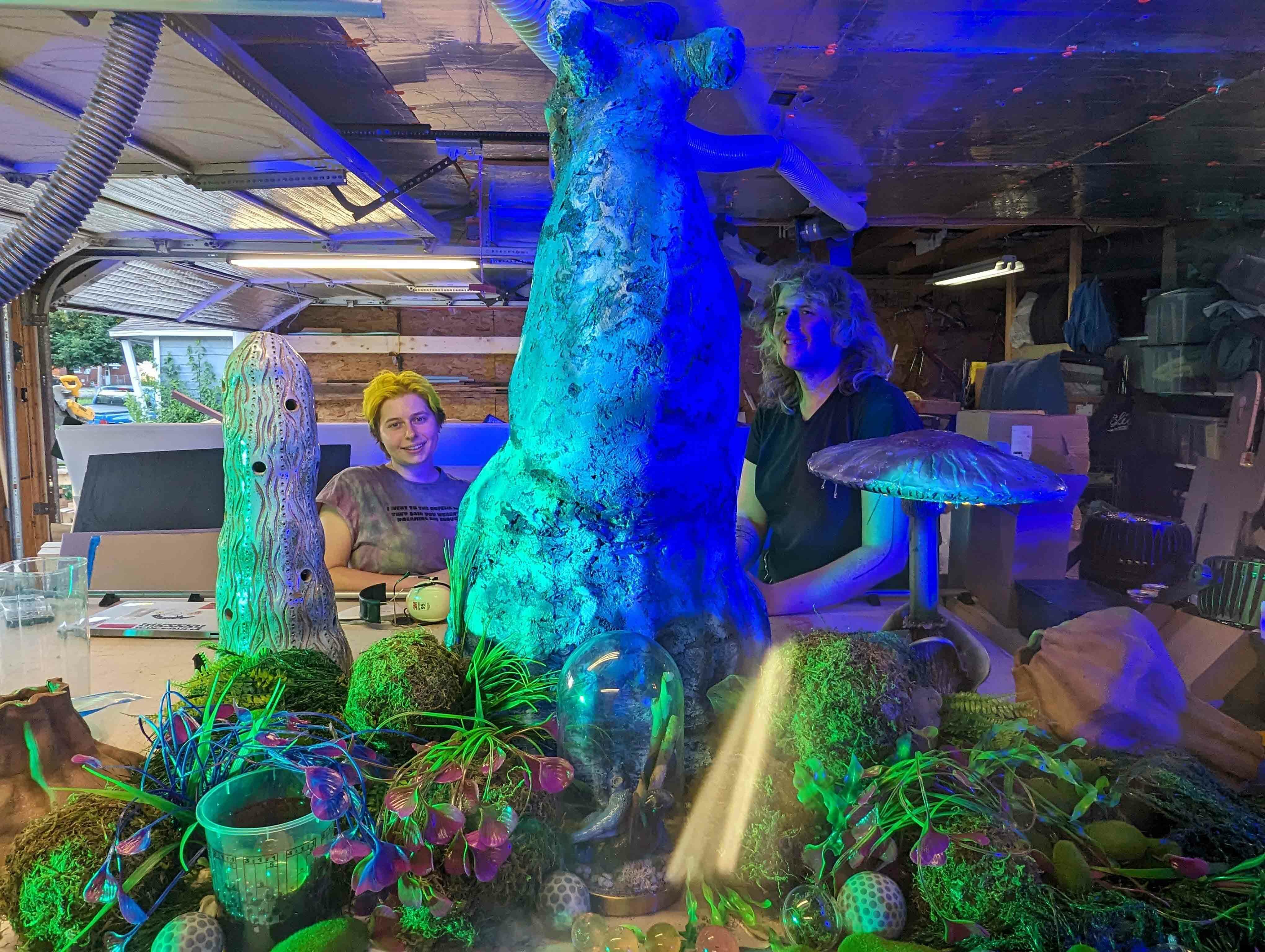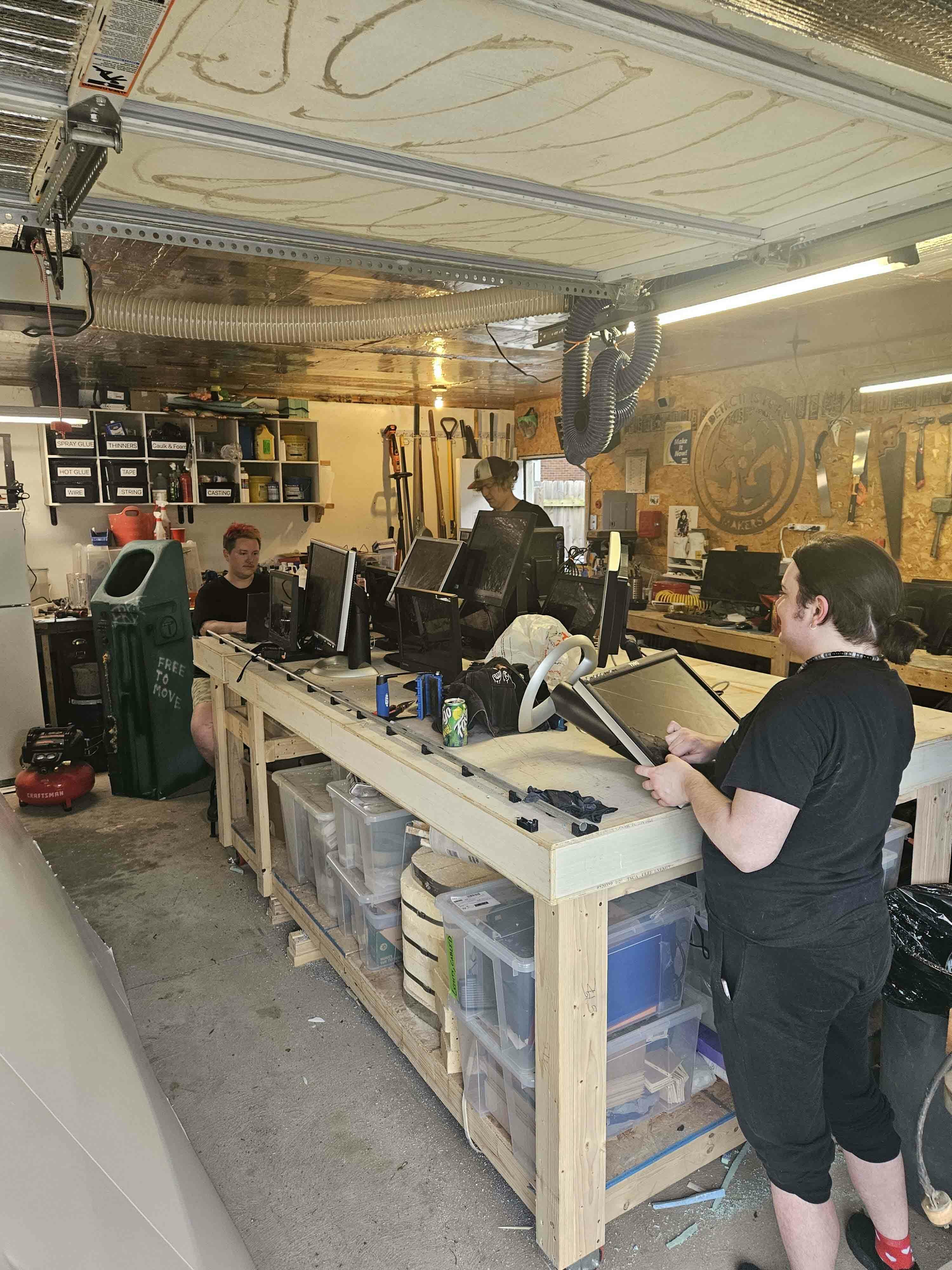Imagining What Queer Nightlife Will Look Like 30 Years in the Future
A Night at the Orfelia event in Detroit envisions raving in abandoned salt mines and DIY gender transitions

It’s impossible to predict what any given guest will experience at A Night at the Orfelia on June 29. That’s by design. The simplest description of the event is that it is an immersive, future-focused art installation that will transform Bert’s Warehouse Theatre into the Orfelia, Detroit’s hottest nightclub, in 2054. The (alternate) reality is so much more.
Organizers from the Queer Futures Collective have imagined and curated every aspect of the one-night-only event to trigger intended and unintended emotional responses, from calming spaces like a room filled with local wildflowers to the futuristic, pulsing lights and heavy, rhythmic sounds of a familiar-but-not-quite-familiar dance club setting. If there’s a unifying theme to be found in the installation, it might be a constant reminder to examine a not-so-distant era free from societal expectations around concepts like gender — what life might look like in a “trans-techno future.”
Each artist participating in the installation will offer their own interpretation of this central theme: What if we could hold all-night raves among the ruins of the future abandoned Michigan salt mines? What if, by 2054, scientists have genetically engineered fungi that could decompose plastics while delivering a soothing melody? While we’re at it — what if we’ve managed to truly shatter the binary?
Press materials for the event invite guests to do things like “grab an embroidered hanky to flag kinks not-yet-possible or fondle a genetically engineered slug designed for DIY hormone treatment.” Additionally, you are invited to “sip drinks made with food waste while cheering on your favorite wrestler in the ecosexual wormplay play-space.” The Orfelia, organizers promise, fosters a vision of a possible queer future to bring to life our most weird and wonderful desires.
Organizers Dylan Box and M Kuznetsov, who both use they/them pronouns, have backgrounds in creative technology, including working together on a project for MIT called the Gender Generator, part of the university’s Generative Unfoldings exhibition. Kuznetsov has produced two publications, a newsletter called The Finkedin Dispatch and a zine focused on exploring drag influences for adversarial attacks on facial recognition. Box frequently works on building community-driven creative spaces in Detroit, including work with the Mt. Elliott Makerspace and the Detroit Library’s Hype Teen Center, as well as contributing to the opening of artist spaces The Untitled Bottega and the Riopelle Collective at Eastern Market.
Box and Kuznetsov sat down with Pride Source ahead of A Night at the Orfelia to talk about what inspired them to create the event and why they feel it’s important to create truly unique experiences like this in the Midwest. A Night at the Orfelia is set for June 29 from 7 p.m. to 2 a.m. at Bert’s Warehouse Theatre (2739 Russell Street, Detroit).

A Night at the Orfelia is challenging to explain, and I’m guessing that’s on purpose. How do you tend to explain the concept to people completely unfamiliar with it?
M Kuznetsov: Overall, what people should expect is that we’ve brought together dozens of queer Midwestern artists to create specific installations to create a nightclub from the future. So what that means is there’s a DJ lineup just like a regular nightclub, but it’s just that the nightclub is from 2054 and we showcase these prototypes of possible futures we’ve asked the artists to create that answer the question, “What does your preferred 2054 look like?”
When you step through the doors at the Orfelia, you’re in 2054. You’re prototyping a possible future that asks, “What would it look like if our technology was centered on trans joy?’ Whether that’s seeing robot fights or just exploring imagined spaces in the venue. Theoretically, it’s an art piece that serves to critique the present day by turning our attention to what could be — a way to inspire agency, using existing references. We’ve called it a Meow Wolf of sorts, but one that is a little more damp — a little weirder — and one that asks you to go change your present to make that future possible, if that’s the future you want.
Why are you calling the nightclub “Orfelia”?
M Kuznetsov: The Orfelia is an intentional naming decision that Dylan and I came to when we were thinking of how many towns have an Orpheum Theater as a community hub or central location for entertainment. We were thinking, “What if the Orpheum went through a gender transition? What would it look like in 30 years, if it was a little weird and goopy?” Orfelia summons this idea of “orifice,” as well. In our world, we often employ this shorthand to give it a not-quite-here vibe, where we just slightly misspell a word so that it looks just a little out of place, but you can still understand what it is. Orfelia is sort of what an Orpheum Theater looks like, reinvented for the future.

This project has been a year in the making. What has inspired you to keep going?
Dylan Box: We literally could not do this without community support to make it happen, and I hope that when anyone comes to this event, they feel connected to that community of care and that community of support and are able to see a possible future working together with collective action to create this vision of utopia in our future. We’ve done a lot of work and a lot of reading about queer theory, which has been very inspiring.
We want people to have a good time and to experience a lot of queer joy in the present and to get their hands dirty building robots, and to dance and connect with the people around them who are also trying to make this world a reality.
In a way, Night at the Orfelia seems a bit like an anti-Pride. It feels like the polar opposite of a more corporate-fueled event. What does that mean in terms of funding?
M Kuznetsov: Yes. We not only consider ourselves antithetical to corporate Pride, but in many ways, we are bootstrapping this project, Dylan and I, from our personal savings that we’ve earned from working in tech, because there’s not a ton of arts funding available, let alone for projects in the Midwest. This project, by nature, shows the gaps of what’s out there in terms of queer art support.
This is specifically a Detroit and a Midwestern project because queer people don't just live on the coasts and finding funding for kind of weird, non-sanitized queer art is very, very difficult. That’s why we’ve chosen to self-fund because we believe this is pretty much the only way we can make it happen because corporate Pride is not going to support sexualized or horny or non-capitalistic means of queer expression. In our world, we talk about how everyone has a 20-hour work week, and I don’t think JPMorgan Chase is gonna fund that.
Will you be able to recoup your investment?
M Kuznetsov: We’ve spent a lot of time talking about this event as intentional, and ticket prices are also intentional. We will actually probably not break even on ticket prices alone because we’ve intentionally priced them very low so that they’re accessible to all members of the community. We’ve had an advisory board tell us these tickets should be $150-200 due to the scale of the event, but we know doing that would limit access to the event. Queer people are often lower income. We don’t want people to be prevented from coming to our events.
Dylan Box: A lot of attendees are also our volunteers who are showing up to help make this happen, and as a result, they can come in for free. We’ve been able to offer reduced entry tickets thanks to some generous donations, as well.
What are a few stand-out experiences people won’t want to miss?
Dyan Box: All of them! But specifically, one is that we are partnering with the Detroit Sound Conservancy to showcase some new expectations of technology. They’ll have the Club Heaven sound system on display. One big one is the salt mines.
M Kuznetsov: Yes, the salt mines installation is a great example of what it means to have a place-based feature. The mines are underneath our feet and they’ve been around since the early 1900s, and we think that in 30 years, climate change will mean that in the Great Lakes, we don’t really have snow anymore. They might go out of business because there’s no market for road salt. These abandoned mines become a place for people to rave — the future of Midwest raving has really resonated with people. We made a short reel on Instagram that got half a million views.
We also have robot fights, a gender-affirming clinic from the future, a worm wrestling pit, a gender circus, a reflection room with prairie flowers where you can think about the future, a build-a-cyborg, drag personas from the future, skin fusion fabrics…
Dylan Box: Oh, and performance pieces by local artists about gender and culture, including an Armenian artist. One important booth is kind of a mutual aid station — we are really committed to public health, so there are opportunities to get access to Narcan, fentanyl testing strips, Covid tests and masks and various other safety devices. We want this to be safe for the community.
We’re taking our years of partying and event experience and trying to actually push the format of nightlife forward in Detroit, as well. We’re partnering with 313 Care Collective, which is a local mutual aid collective, and also the Wayne County Health Department.
M Kuznetsov: We’re really proud to have event monitors, a code of conduct and messaging around consent at our event. We have turned down venues due to their lack of accessibility, too. We’re providing seating in the venue, for example. We want to not only imagine a future of nightlife but to provide the foundation at our event to imagine what nightlife can also look like in the present day.
Learn more about A Night at the Orfelia and purchase advance tickets at ra.co/events/1904761.










